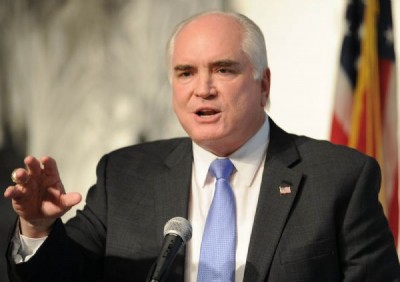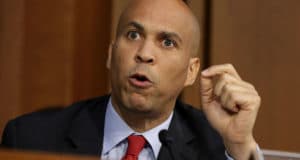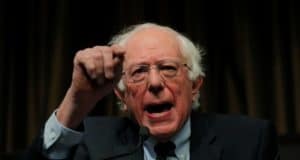
Rep. Mike Kelly
The Obama Administration might have used the powers given it by the 2009 auto industry bailout to shut down some car dealerships owned by Republicans—at least that’s the allegation being made by two Republican congressmen, Mike Kelly of Pennsylvania and Jim Renacci of Ohio.
The charges center around part of Uncle Sam’s efforts to save General Motors from itself in 2010. Part of the bailout process for GM was to get rid of unprofitable small dealerships, mostly in small towns. To be fair, this effort made sense; a lot of those dealerships were too small to be profitable, and many of them should have been closed down long ago.
Dealership Profiling Alleged
The problem, according to Renacci and Kelly, is that a high percentage of those dealerships were owned by Republicans. The dealerships that had their relationships with General Motors terminated included Renacci-Doraty in Wadsworth, Ohio, owned by Renacci’s family, and Wayland Chevrolet, started by Kelly’s father. Both men claimed that they decided to run for Congress because their family dealerships were taken away.
The two are alleging that the Treasury Department profiled dealerships to pinpoint conservative or Republican-owned car lots. Those dealerships would have been more likely to be shut down than Democrat-owned dealerships.
Renacci and Kelly have no proof of their claims, so they’re asking Secretary Lew to turn over the records from the Automotive Task Force so they can search for evidence. The two would like to see the methodology used to justify closing Chrysler and General Motors dealerships in 2010. The process involved the stripping of dealers’ rights to sell new GM and Chrysler products. The idea was to cut the number of car dealers and the automakers’ distribution expenses. It isn’t clear if Lew will turn over the records or if other congressmen will go along with their efforts.
Example of Why Bailout Was a Bad Idea
These claims are a perfect example of why the $50 billion bailout of General Motors by the federal government and a similar bailout at Chrysler were a bad idea. Any such government involvement in business politicizes business and business decisions. Business decisions start getting made for political reasons—say, to please a specific group of voters.
Profiling is of course part of politics; politicians try to profile constituents so they can reward their friends and punish their enemies. That seems to be exactly what had happened here and in the IRS Tea Party profiling scandal.
We all know that the bailout was about politics and not saving the auto industry. America actually has more auto factories and automakers now than it did in the 1970s. The problem is that most of those new auto factories are located in Republican-leaning states like Tennessee, Alabama, Texas, and Mississippi, and the workers in those factories are not represented by the United Auto Workers (UAW), a key Democratic constituency.
Short Message For Those Who Desperately Want Out Of The Rat-Race But Need A Steady Stream Of Income
Those factories are, of course, run by companies like Toyota, Volkswagen, Hyundai, Honda, Nissan, and Mercedes. In fact, Toyota is now America’s second largest automaker, and it didn’t need a bailout. It might also be pointed out that one of the Detroit “Big Three,” Ford Motor Company, didn’t need a bailout either. Ford did get a $5.9 billion loan, but it really didn’t need one during the bailout.
The UAW Bailout
The real reason for the bailout was to save the UAW and keep all those union dues flowing to Democratic politicians. The auto industry was actually in very good shape and would have gotten stronger if dinosaurs like Chrysler and GM had been allowed to die off.
A better solution would have been to allow GM to go bankrupt and sell off its components to investors or other auto companies. That strategy worked in England, where failing companies like Jaguar and Land Rover were sold to foreign investors. They’re still in business and making money even though they’re owned by an Indian company named Tata Motors. Tata would have gladly bought Cadillac and Jeep if they had been on the auction block. The problem is that the first thing Tata would have done at those companies would have been to break the UAW contract. The Democrats didn’t want that to happen, because that would have also cost a lot of UAW jobs.
So instead, the taxpayers got stuck with the bill, and it looks like they’re still paying. The Treasury still owns about 15 percent of General Motors, which is supposedly making money again. This is largely because it has a profitable division in China; however, GM is unfortunately still stuck with a very unprofitable division in Europe (Opel-Vauxhall), which might still drag it down.
Opel Vauxhall isn’t making money and should be shut down or sold off. It won’t be, however, because of politically powerful autoworkers unions in Western Europe. Opel currently has less than 5 percent of the German car market, so shutting it down might be a good idea, but that won’t happen.
General Motors’ stock is currently worth around $33 a share largely because the Treasury has propped it up. If the Treasury sells the rest of the GM stock it owns, it might collapse.
Corporate Welfare
As you can see, the bailout was little more than corporate welfare for big unions and an ailing company. Unfortunately, neither Congress nor the media has had the guts to seriously investigate the bailout. Instead, they’ve bought the party line that it saved the auto industry when it clearly did not.

Rep. Jim Renacci
Hopefully, Kelly and Renacci’s investigation will expose the truth about the auto industry bailout and lead to some real reform. It’s obvious that the entire auto industry bailout was unnecessary, corrupt, and totally politically motivated. Why should people that live in California and drive Toyotas have to pay to “save” the jobs of UAW members in Ohio or Michigan?
We cannot undo the bailout, but Kelly and Renacci could perform a vital service by exposing the corruption about it. That might at least help prevent such a politically motivated boondoggle in the future.
Republicans and Democrats from outside the Rust Belt need to get on the Kelly and Renacci bandwagon. They need to find out exactly what happened and if small town car dealers were really targeted for shut down because of the party that they gave money to.
Initiatives like the bailout give government and politicians far too much power over citizens’ lives and the economy. Worse, they encourage a welfare mentality; people believe that they are entitled to a job or a business and that the government has to pay for it.
Renacci and Kelly believe they were entitled to run car dealerships. Whether those small-town dealerships could actually make money wasn’t the point; they were an entitlement. Just like those jobs the UAW members have, those are an entitlement, not a job in the union boss’s minds.
The Joke Might Be on Obama
There is an interesting irony in all this. If the Obama administration really did target small-town car dealerships for shut down, it hurt itself in the process. Mike Kelly and Jim Renacci only ran for Congress because they lost their dealerships. If the Administration had let them keeping selling Chevys, they would not be in a position to expose this scandal now.
The Obama administration might be feeling the effects of its own poorly conceived and politically minded actions. It could be hurt from the backlash from the failure of the auto industry bailout.
 Off The Grid News Better Ideas For Off The Grid Living
Off The Grid News Better Ideas For Off The Grid Living




